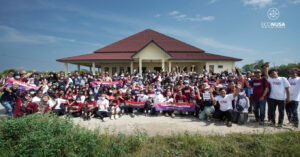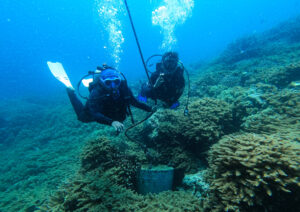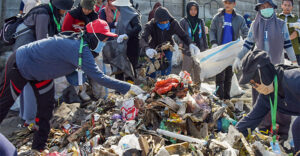
Sufficing food is the most fundamental needs for human. Community resilience and independence to suffice their own food requires sustainable agriculture. Unfortunately, in this modern era only few young people are interested in agriculture. Whereas, during the Covid-19 pandemic that currently hampers distribution among regions, food security and self-reliance are badly required to make the community independent from any food supply both from other regions and government.
By a quirk of fate, there are still youngsters having concerns with agriculture in West Papua. Unlike the peer young peoples who are keen on moving out and striving for modern urban life, Naomi Kemesrar, 19, and Yoab Sagisolo, 23, who come from Mlaswat Village, Saifi District, South Sorong Regency, West Papua, have persistence to cultivate their local land by doing agricultural practices. Mlaswat village itself is also supported by non-profit organisation Bentara Papua. Both of them have so far been keen on land cultivation after they took parts in a Social Transformation School (STS) in November 2019.
STS is part of School of Eco Involvement (SEI) series held by EcoNusa Foundation in collaboration with the Indonesian Society for Social Transformation (INSIST). It aims to build local resilience on food, energy and environmental management. The program is participated by selected participants representing certain villages. There they learn organic farming by utilizing the existing resources at their villages.

Not only Mlaswat, but also nine other villages in West Papua such as Suswa – Kombif, Malalilis, Klatomok, Klasowoh, Malawer, Klayili, Kwakeik and Kamandu Tetar took parts in this training. Upon completing STS, the participants take the Village School or Field School in which they practice their knowledge from STS at their own villages for three months.
Read also: Seeding For Food Security
“Prior to studying agriculture, every day after school we just did nothing but sitting. We might help our parents to pick fruit in the forest or go fishing. Now, we are busy farming almost every day. I realize that agriculture is important. We now know how to plant correctly. To keep plant growing we should give fertilizer. We can pick our own vegetables without going to market,” said Naomi to EcoNusa team.
According to Naomi, in her village, there are actually many young people who are studying agriculture at universities in big cities. Unfortunately, when they returned to the village, not many of them applied their knowledge to build their village. This prompted her to share her agricultural knowledge with the villagers, so that everyone would have basic agricultural knowledge. In line with Naomi, Yoab also said the same thing.
“Young people in this village, you could say only the two of us who really understand modern agriculture. Many young people in the village who attend higher education in the city. Even Though there are many of them who studied agriculture, but they cannot develop their knowledge. Instead, they often ask me how modern farming is like, ”said Yoab

Yoab actually knew agriculture since he was a child because his parents were farmers. However, the farming methods he knew were limited to wild farming. They open land for farming then leave it. Since joining the field school, he has become more aware of modern agricultural science that does not destroy nature. Together with Naomi, he delivers his knowledge to his parents and the villagers.
If Naomi only grew vegetables, such as kale, long beans, spinach, mustard greens, and rica or chilies, Yoab does the different things. Besides vegetables, he also cultivates fruit and medicinal plants, such as papaya trees, itchy leaves, african leaves, and betel. He does it not without a reason. In his village there are only limited types of medicinal plants known by the villagers. So, he planted medicinal plants to give the villagers more knowledge also that there are actually many nutritious medicinal plants around their village that can be cultivated.

Beside meeting his daily needs for food, recently Yoab has been growing betel and is planning to sell it. Betel is quite attractive to villagers because the culture of chewing areca and betel is still heavily practiced in their village. According to him, areca is easy to obtain, but betel is very difficult to obtain. People have to enter the forest to get betel leaves. Thanks to Yoab, now people don’t have to go far into the forest because they can pick them in the village garden.
Before joining the STS, Yoab actually had prepared himself to move to town as his peers did. However, he called off his plan and decided to stay at his village. After completing the field schooling and practicing the farming, he has strong confidence to stay at his homeland. He wants to focus on developing his village by local farming.
Read also: Samo Residents Built Food Independence
“The land of Papua is vast. But most of the younger generation only focus on finding higher education, but not many who want to raise the potential of the village. Before I started gardening, no one had the initiative to create a modern organic garden. So, instead of moving to the city, I chose to stay in the village and invite other young people who don’t have enough money to go to school to keep them productive by doing gardening. In addition, now the economy is difficult. This garden is very helpful because when we need to eat, we just have to pick vegetables, ”said Yoab by telephone with the EcoNusa team.
Both Yoab and Naomi, who are also volunteers for the Bentara Papua, have big dreams. One day their trial of planting the village garden with various kinds of food plants and developing seeds and fertilizers could become a source of income for the villagers of Mlaswat village. Both of them hoped that the garden products and the seeds which they developed could be sold to other villages or areas in the future.

“A self-reliant villager who suffice their own food will not by all means be easy to receive others’ offer that is intended to grab the natural resources surrounding the village. But, if there is no more young people who is interested in farming and treating their land properly, one day we will loss our land, water resource, sources of knowledge and life. With the series of School of Eco Involvement Program such as STS, EcoNusa Foundation expects that the participants could become tough and independent cadres who could make their own decision for the sake of their livelihood and they could become a driver for their villages,” said Carmelita Mamonto, SEI Program and Maluku Region Hub Coordinator of EcoNusa Foundation.
Editor: Leo Wahyudi








